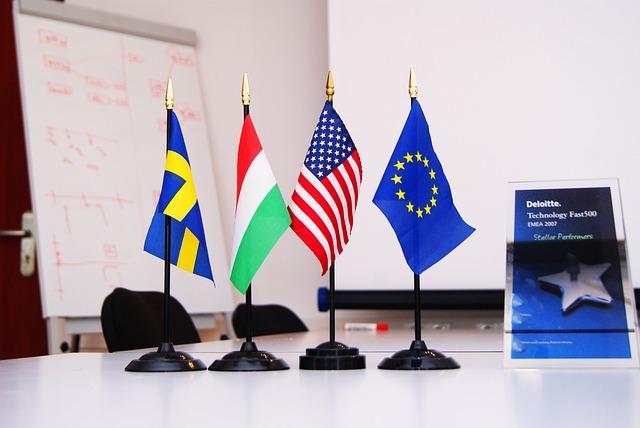As geopolitical tensions escalate in the Baltic region,Denmark and Finland have taken a notable step towards bolstering their defence collaboration through a newly forged defense deal. the agreement, which aims to enhance military cooperation and preparedness, comes amid heightened concerns over security dynamics in Northern europe, particularly in response to perceived threats from neighboring Russia. This strategic partnership not only underscores the growing interdependence among Nordic nations but also reflects a broader commitment to maintaining stability and deterrence in a region that has witnessed increasing instability in recent years.By investing in joint defense initiatives, Denmark and Finland are positioning themselves as proactive players in the face of regional challenges, signaling their determination to navigate a rapidly evolving security landscape. As the situation unfolds, this alliance may serve as a pivotal framework for addressing future threats and ensuring the safety of their territories.
Denmark and Finland Strengthen Military Ties Amid Geopolitical Uncertainty
In response to escalating tensions in the Baltic region, Denmark and Finland have formalized a significant defense agreement aimed at enhancing their military cooperation.This pact comes at a critical juncture,marked by increased military presence from various nations and growing security concerns. Both nations recognize the importance of unity in addressing potential threats, particularly in light of recent geopolitical shifts instigated by external powers. By pooling resources and strategic capabilities, they aim to bolster their readiness and resilience against a rapidly changing threat landscape.
The agreement outlines several key areas of cooperation, including:
- Joint military exercises: Regular training operations to enhance interoperability among forces.
- Intelligence sharing: Improved mechanisms for exchanging vital information on security developments.
- Supply chain collaboration: collective efforts to ensure a robust supply system for defense equipment and resources.
As Denmark and Finland embark on this enhanced partnership, both countries emphasize the necessity of adaptable defense strategies to counter emerging threats effectively. This alliance not only signifies a commitment to national and regional security but also reflects a broader trend of Northern European nations seeking solidarity in the face of uncertainty.

Analysis of the Rising Tensions in the Baltic Region
The recent defense alliance between Denmark and Finland comes at a pivotal moment as military and geopolitical tensions saturate the Baltic Sea region.With the ongoing situation in Ukraine and the upsurge of hostility towards NATO by Russia,the Baltic countries are increasingly aware of their vulnerabilities. This cooperative agreement aims to enhance operational readiness and collective defense capabilities,responding to escalating concerns over security threats. Key components of this deal include:
- Joint military exercises to bolster interoperability between the two nations’ armed forces.
- Increased defense spending focused on advanced military technology and infrastructure.
- Shared intelligence resources to monitor and respond to regional threats more effectively.
This collaboration not only strengthens the bilateral ties between Denmark and Finland but also sends a potent message to neighboring countries regarding regional unity against potential aggressors. The move has sparked discussions in the broader nordic context, inviting discussions among other nations like Sweden and Norway to align their military strategies in response to potential conflicts. As tensions remain high, both countries are committed to maintaining peace and stability in the Baltic, creating a fortified front against external pressures.
| Key Defense Agreement Elements | Purpose |
|---|---|
| Joint military exercises | Enhancing interoperability |
| Increased defense spending | Creative technology investments |
| Shared intelligence | More effective threat response |

Key Features of the Denmark-Finland Defence Agreement
The recent defence agreement between Denmark and Finland marks a significant evolution in regional security, driven by increasing tensions in the Baltic Sea area. Among the key features of this pact are enhanced military cooperation and a commitment to joint training exercises. this initiative aims to fortify deterrence capabilities against potential threats and ensures that both nations can rapidly deploy forces in response to crises. Additionally, the agreement emphasizes intelligence sharing, which is critical for staying ahead of evolving security challenges in the region.
Another notable aspect of the deal is its focus on interoperability between the armed forces of Denmark and Finland. This includes standardizing equipment and dialog systems to ensure seamless collaboration during operational missions. Furthermore, the agreement outlines provisions for collective defence mechanisms and crisis response strategies, enhancing both countries’ resilience in a rapidly changing geopolitical landscape. Below is a summary of the primary elements of the agreement:
| Feature | Description |
|---|---|
| Joint Military exercises | Regular training to improve readiness and operational effectiveness. |
| Intelligence Sharing | Collaborative efforts for enhanced situational awareness. |
| Interoperability Initiatives | Standardization of systems for efficient collaboration. |
| Collective Defence Commitments | strategic cooperation to respond to regional threats. |

Implications for Nordic Security and European Stability
The recent defense agreement between Denmark and Finland presents several significant implications for nordic security and broader European stability amidst heightened tensions in the Baltic region. As both nations bolster their military cooperation, they are enhancing interoperability, which is crucial for responding effectively to potential threats. This partnership aims to facilitate joint exercises, share intelligence, and ensure rapid deployment capabilities. The strategic collaboration underscores a collective commitment to safeguarding not only national sovereignty but also regional security, particularly in the face of aggressive posturing from neighboring countries.
Moreover,the agreement symbolizes a growing recognition in Europe of the importance of solidarity among Nordic and baltic states. As these nations unite their defense strategies, they are sending a powerful message to external aggressors about their readiness to respond collectively. In this context, key factors influencing regional security will include:
- Increased military presence: Enhanced readiness and deterrence against potential threats.
- Strengthened alliances: Solidifying ties with NATO and other European partners.
- Resource sharing: Collaborative investments in defense technology and capabilities.
In terms of broader European stability, the Denmark-finland deal could lead to a ripple effect, encouraging other nations in the region to reassess their defense policies and partnerships. Any shift towards improved regional cooperation is highly likely to foster a more robust framework for addressing security challenges, ultimately contributing to a sustainable peace throughout Europe.

Recommendations for Enhanced Multinational Cooperation in Defence
As geopolitical tensions in the Baltic region escalate, it becomes increasingly vital for countries to cultivate robust alliances in defense. Multinational cooperation can play a pivotal role in strengthening defense capabilities against external threats. Key recommendations for enhancing such cooperation include:
- Joint Training Exercises: Regularly scheduled military drills involving multiple nations can improve interoperability and readiness among forces.
- Information Sharing: Establish comprehensive communication networks that facilitate seamless data exchange regarding threats and intelligence.
- Resource pooling: Create initiatives for shared military resources, such as weapon systems and logistics, to minimize costs and maximize efficiency.
- Policy Alignment: Work towards harmonizing national defense strategies and policies to ensure unified responses to emerging threats.
Moreover, establishing a formal framework for multilateral defense agreements can solidify commitments among nations. A strategic forum could focus on prioritizing mutual defense initiatives, investing in collective security technologies, and fostering diplomacy to mitigate conflicts. A sample overview of potential defense collaboration initiatives could be summarized in the table below:
| Initiative | Participants | Objective |
|---|---|---|
| Joint Maritime Patrols | Denmark, Finland, Sweden | Enhance maritime security in the Baltic Sea. |
| Military Technology Collaboration | All Scandinavian Countries | Develop advanced defense technologies together. |
| Crisis response Task Force | Estonia, Latvia, Lithuania | Joint rapid response to regional crises. |

Future Prospects for Regional Defence Strategies in the Baltics
The geopolitical landscape in the Baltics is undergoing significant transformations as nations reassess their defense strategies in light of rising tensions. The recent defense deal between Denmark and Finland underscores a growing commitment to regional security. This collaboration is expected to enhance military interoperability, coordination, and strategic deterrence against potential aggressors, thereby fostering a more robust Baltic defense posture. Countries in the region are likely to explore similar partnerships and increased military investments to bolster their readiness.
Key factors influencing future defense strategies in the Baltics include:
- Increased NATO Presence: Continued enhancement of NATOS eastern flank, including more ample troop deployments and joint exercises.
- Regional Alliances: strengthening partnerships among Baltic states and Nordic countries to create a unified defense approach.
- Technological Advancements: Investment in modern military technology such as drones, cyber defenses, and intelligence-sharing platforms to counter hybrid threats.
- Defense Budgets: A trend towards increasing defense spending to meet the 2% GDP guideline set by NATO and to ensure adequate funding for essential military capabilities.
| Country | Defense budget (2023, in billion USD) | Key Focus Areas |
|---|---|---|
| Denmark | 5.5 | Cybersecurity, Naval Capabilities |
| finland | 4.5 | Territorial Defense, Armored Units |
| Estonia | 0.7 | Cyber Warfare, Resilience Training |
| Latvia | 0.6 | Infantry,Host Nation Support |
| Lithuania | 1.3 | Air Defense, Modernization of Forces |

Wrapping Up
the recent defense agreement between Denmark and Finland marks a significant step in strengthening regional security amid escalating tensions in the Baltic area. With both nations committed to enhancing military collaboration and readiness, this partnership not only bolsters their individual national defenses but also contributes to broader stability in Northern Europe. As geopolitical uncertainties persist, the evolving landscape underscores the importance of strategic alliances among Nordic countries. The commitment shown by Denmark and Finland sets a precedent for cooperative defense measures,perhaps inspiring similar initiatives among other nations in the region.As the situation develops, it will be crucial to monitor the implications of this deal and its impact on the dynamics in the Baltic Sea and beyond.
















